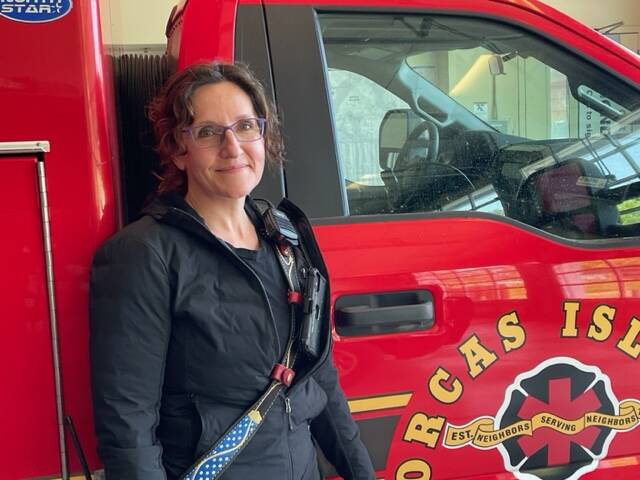by Toby Cooper
Sounder contributor
In early May, Orcas Fire Chief Scott Williams announced his resignation and Holly vanSchaick was appointed interim fire chief.
Acting at a special meeting on May 11, the board of fire commissioners voted unanimously to place a levy lid lift on the ballot for the Aug. 1 primary election.
At stake is the continued operation of all firefighting and EMS services. A flurry of negative public reactions followed the announcement.
Orcas Island Fire & Rescue is funded annually through a portion of property taxes — a levy — that is currently capped by a voter-approved annual levy lid of $1.05 per 1000 of assessed value. For example, a property owner with an assessed value of $500,000 would owe a tax of $525 (derived by the formula, $1.05 X ($500,000/1000) = $525. The theoretical budget for OIFR is likewise established by applying aggregated, island-wide assessed value data –instead of the value of a single home – to the same formula.
Budget calculations for OIFR, however, are complicated by the existence of a statewide constraint, known as Initiative 747, that starves the department of needed funds even during times of rising real estate values and population growth.
Initiative 747 — one of roughly 17 such constraints imposed on Washington’s public services and infrastructure by prolific anti-tax activist Tim Eyman — limits revenue increases at OIFR to one percent annually, effectively rendering the $1.05 levy rate financially impotent.
According to Annie Sieger of Emergency Services Consulting International, who assisted the Board in preparing the financial parameters of the levy lid lift, the Initiative 747 constraint has been in place for the full 10 years of the current levy’s existence. The resulting budget shortfall compounds over time.
If one were to work the levy formula backward, starting with revenues of $2,383,992 available to OIFR under the current levy system, and place that number opposite the total of Orcas assessed valuations, and then solve for the levy rate that creates that result, you will discover that the implied levy rate is only $.58 instead of $1.05.
It is against this backdrop that the commissioners are now asking Orcas voters to lift the lid on the levy from $1.05 per $1000 of assessed valuation to $1.06. Since the actual mathematical lift is from $.58 to $1.06, after taking Initiative 747 into account, the resulting boost to the department’s budget under a $1.06 levy is approximately 82.7 percent.
In the absence of the levy lid lift, or if the current proposal were to fail, Sieger’s analysis shows that OIFR would amass a cumulative budget shortfall of $22 million over the next 10 years.
And the tax impact on that hypothetical $500,000 property? It would equate to an additional $20 per month or $240 per year, above what is paid now.
Reactions to the May 11 decision came swiftly. Community member Pierrette Guimond protested the lack of public process and the failure to designate a term limit. Justin Paulsen echoed this concern.
Bob Phalan offered that the new structure would place “too much weight on the working class.” Speaking in person at the meeting, he predicted an August vote of “10:1 against.”
According to Guimond, tensions have persisted between commissioners, the department, volunteers and segments of the public over time. In 2022, Commissioner Rex Chadwell stepped down under public pressure. At another time, the firefighters union filed a vote of no confidence against Chief Scott Williams.
With the board’s public process stumbling and citizens speaking their minds, the department is caught in the middle.
Interim chief vanSchaick laments the divisive tone in the community.
“I fear for the department’s morale,” she said, her words echoing in the headquarters’ garage. She spoke of the passion the firefighters, paramedics, EMTs, and volunteers feel for their jobs. “They save lives every day. We can discuss budgets, service levels, response time. I get that. But the personal attacks … that’s not the Orcas I know.”
Retired EMT Patrick Shepler, now living in St. Petersburg, Florida, returned to Orcas virtually to attend the May 11 special meeting. Shepler served as an Orcas paramedic under four fire chiefs — over almost two decades — and previously as a mainland EMT. In 2021, he was elected to the board but resigned after serving only half a year.
Shepler is concerned that a toxic political environment will eventually undermine the department’s ability to deliver its array of vital public services. While he sees no place for personal attacks, he offers harsh but constructive criticism for the board’s “incompetent fiscal governance” that has sent OIFR to the brink of today’s “levy cliff” — for which they had 10 years to prepare. Moreover, he believes the levy lid lift faces an uncertain future unless the tenacious non-financial issues are properly addressed.
Commissioner Nick Negulescu agrees. As the board’s designated spokesperson for the upcoming campaign, he is committed to “listening and understanding community voices and finding a way to live together.”



